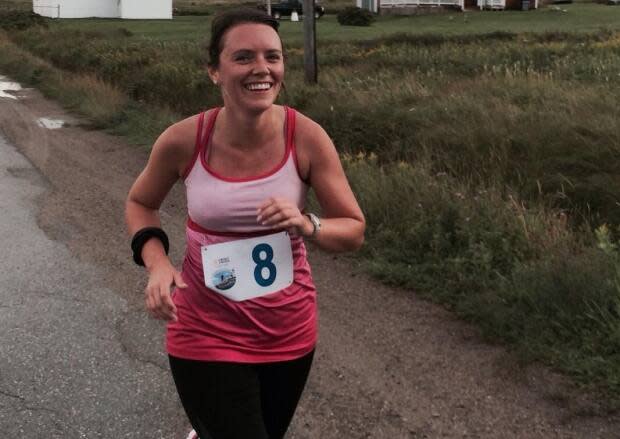Long haul for N.L. woman who believes she had COVID-19


Most of us think back longingly to the time before the pandemic, but a Newfoundland woman has more reason than most to wish her old life back.
Stacey Alexander of Corner Brook is convinced that her health troubles over the past year are a direct result of getting COVID-19, even though she was turned down for testing in early 2020 and never had a chance to be diagnosed.
Alexander believes that she now suffers from what has become known as long COVID, or long haul COVID — a term used to describe the effects of COVID-19 symptoms lingering long after the initial illness — and she's telling her story to encourage others to take the virus seriously.
"I'm hoping this is something that I get over. But people should be aware that it is a possibility," said Alexander.
Young and healthy
Alexander wishes she could turn back the clock to a time prior to the pandemic when, at the age of 33, she was a healthy, active person, teaching physical education at the elementary school level and engaging in some of her favourite activities, including running and snowboarding.
Alexander said life took a turn for her when she and her husband started suffering from gastrointestinal symptoms and cold symptoms in February 2020.
The symptoms varied over a period of several weeks but, by mid-March, she began to think that perhaps she had somehow contracted the novel coronavirus.
At the time, there were confirmed cases of COVID-19 in Canada, but none in Newfoundland and Labrador.
Alexander called the 811 health line to ask for testing and was told to self-isolate, but public health officials who contacted her said since she had not travelled to high-risk areas or been in contact with people who had, she didn't qualify for testing.
When the criteria for testing changed, she again contacted 811 but, this time, after public health got in touch, she was told that she didn't have the cough that was considered a telltale symptom at the time.
"We were refused testing from public health, even though 811 told us to make sure we self-isolate, we have symptoms, and we're not to be out and about," said Alexander.
"So it made it really difficult that … one person was saying to do this and then the other person was saying, 'Well, we're not going to test you because we don't think you have it.'"

Never got better
But things were about to get even worse for Alexander. Even when initial symptoms went away or improved, she started to experience new health problems, none of which she'd ever had before.
Over the course of weeks and now months, Alexander said, she has suffered from fatigue, breathing difficulties, dizziness, night sweats, pins and needles in her arms, headaches, digestive issues, and hair loss. She was recently diagnosed with Hashimoto's disease, a disorder in which a person's immune system attacks their thyroid.
By the end of last summer, Alexander said she started to think that all of her health problems could be the result of long COVID, after she read about people who'd contracted the coronavirus suffering long-term symptoms.
But no medical professional would say that she had COVID, because she had never been tested.
LISTEN | Stacey Alexander explains her condition to CBC's Newfoundland Morning:
Her family physician took her illness seriously, and treated her symptom by symptom.
Alexander decided to seek antibody testing, which she said showed that she had the COVID spike protein antigen in her blood at levels just above negative.
"That one is specific to COVID-19, and you don't develop the antigens for that, unless you were exposed to COVID-19," said Alexander.
"So although it's not a diagnostic test, it's hard to say that I wasn't exposed if I have the antigens in my blood."
Disputed claim
The challenge with Alexander's claim to having had COVID-19 is the timeline; it doesn't line up with when health authorities in this province say the virus arrived here.
CBC asked the Department of Health and Community Services for a comment on her story and whether cases of the novel coronavirus could have existed in Newfoundland and Labrador before the first confirmed case.
In an emailed statement, the department said, "Our epidemiology suggests that our earliest cases occurred in mid-March and were due to travel. It is unlikely cases were circulating in communities prior to that as we did not have any evidence of widespread community transmission at that time. This is supported by a lack of hospital admissions for COVID-19 disease as well as case counts."
Early cases 'pretty likely'
Alexander is undeterred in her belief that she had the virus before mid-March 2020.
And some experts also believe it's highly likely that there were undetected cases prior to the first confirmed diagnoses.
Dr. Lisa Barrett, an infectious diseases specialist and immunology researcher at Dalhousie University, said everyone underestimated the novel coronavirus early in the pandemic, not realizing how easily transmissible it is nor how it can be transmitted by asymptomatic people.
"The likelihood that people were in contact with someone who was in contact with someone that may have traveled is probably pretty high," said Barrett.
"So highly likely that there were cases that we did not know about, not just in Newfoundland, but all across Canada."

Connecting through COVID
Whether her ongoing symptoms are recognized by medical professionals or not, Alexander still has to get up and face them each day.
She is still able to work and to engage in some of the recreational activities she enjoys doing, including snowboarding, even though she tires more easily.
She has connected on the internet with others who have long COVID, and she is finding strength in knowing that she's not alone.
Alexander spends much of her spare time researching to find out what has helped other sufferers.
Felicity Callard is a researcher at the University of Glasgow who has written about long COVID and who has the illness herself, although, like Alexander, she was unable to get tested for COVID and so did not have a confirmed diagnosis.
She said their story is a common one in the United Kingdom.
"In the U.K., the number of tests that were done last spring, compared with the number of people who are predicted to have had it, it is a tiny percentage who had PCR confirmation," said Callard.
"It's a horrible situation for many people.… There's always that potential doubt. 'Will I be believed? Is it COVID? Did I have COVID?' And I think that's subjectively a very, very difficult position to be in as a patient."

Rough numbers
Dr. Lisa Barrett doesn't doubt that some COVID-19 patients end up with long-term symptoms, but she said much more needs to be learned about the virus's impact.
Barrett said it's too early to say what proportion of people with COVID will go on to have other health issues, but she believes it to be far less than one in 10 — maybe closer to one in 100.
"We're still trying to figure it out. I will say it's not the majority of people … but an important percentage because it does affect people's quality of life and perception of health. And that is always something that's very important to understand and recognize," said Barrett.
It's just one more reason, said Barrett, to avoid getting COVID-19 in the first place.
Stay safe
That's a sentiment that's echoed by Alexander, who finds it frustrating that, even after more than a year — with variants of concern circulating, and some areas of Canada in the midst of a third wave — some people still dismiss the seriousness of COVID-19.
Alexander said no one wants to go through what she's experienced since February 2020, and she wouldn't wish it on anyone.
"Even though I'm here today — which I'm glad I'm here, I'm able to do some of the things that I used to do and I'm able to work — it doesn't mean that I'm not going to need help for the rest of my life," said Alexander.

